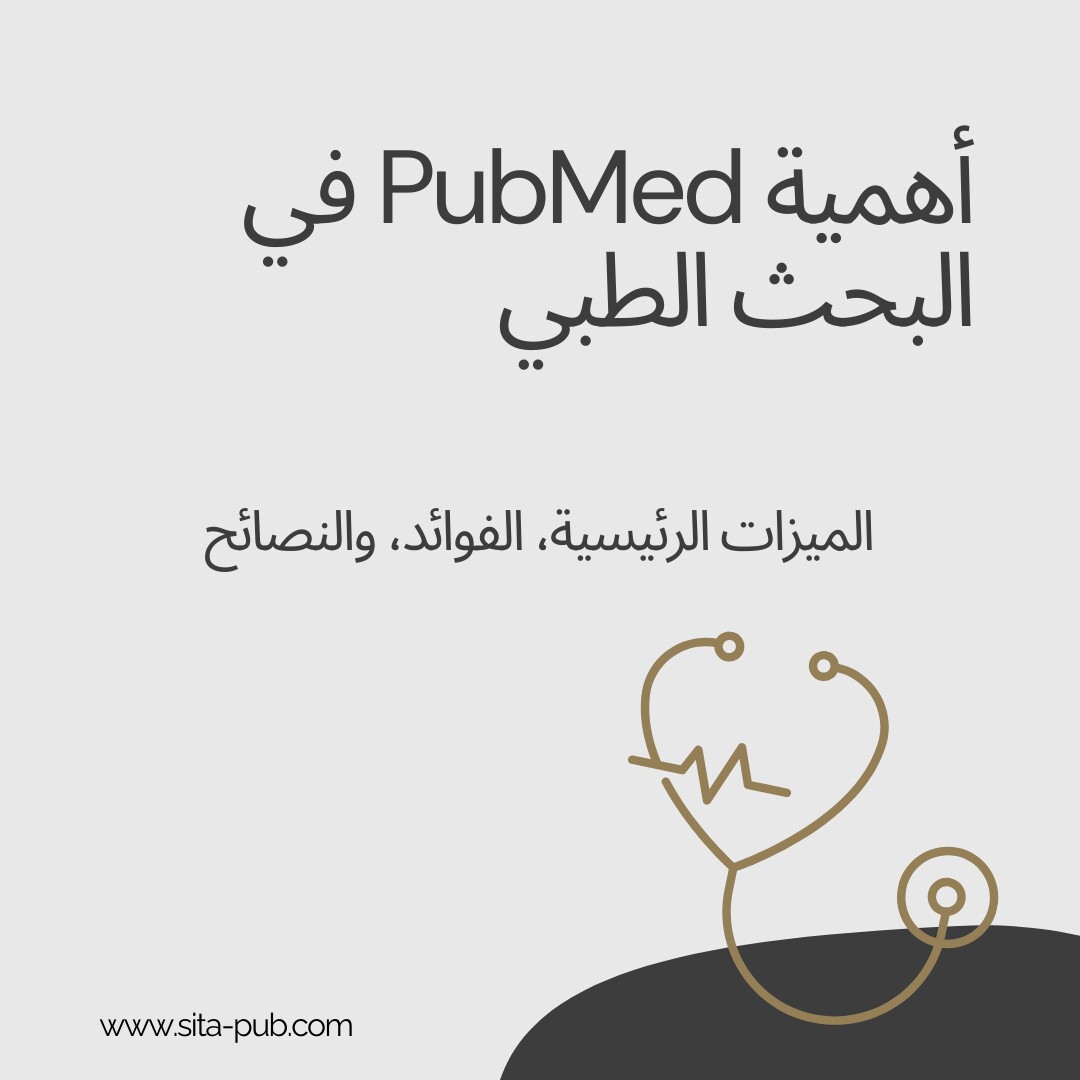أهمیه PubMed فی البحث الطبی


PubMed مکتبه إلکترونیه مجانیه تتیح الوصول إلى ملایین المقالات والملخصات حول المواضیع الطبیه والصحیه. یتم تشغیله بواسطه المکتبه الوطنیه للطب (NLM)، وهی جزء من المعاهد الوطنیه للصحه (NIH) فی الولایات المتحده. تم إطلاق PubMed لأول مره عام 1996، ومنذ ذلک الحین أصبح أداه لا غنى عنها للباحثین الطبیین والعاملین فی الرعایه الصحیه والطلاب.
یعد PubMed أداه حیویه للبحث الطبی والممارسه القائمه على الأدله لعده أسباب:
تغطیه شامله: یقدم PubMed مجموعه ضخمه من الأدبیات الطبیه والصحیه، بما فی ذلک مقالات المجلات والکتب والمنشورات من جمیع أنحاء العالم، ویغطی مجموعه واسعه من التخصصات.
تحدیثات فوریه: یتم تحدیث PubMed باستمرار بأحدث الأبحاث لضمان توفر أحدث المعلومات وأکثرها صله.
مجانی ومتوافر للجمیع: PubMed متاح مجاناً، مما یجعله متاحاً للباحثین والمهنیین والطلاب فی جمیع أنحاء العالم بغض النظر عن مؤسساتهم أو أوضاعهم المالیه.
قدرات بحث متقدمه: یوفر PubMed إمکانیات بحث متطوره، بما فی ذلک البحث حسب المؤلف، العنوان، الکلمات المفتاحیه، ورؤوس الموضوعات الطبیه (MeSH).
مصدر موثوق وموثوق به: کخدمه مقدمه من NLM وNIH، یعتبر PubMed مصدراً معترفاً به على نطاق واسع للمعلومات الطبیه والصحیه الموثوقه.

یتطلب الاستخدام الفعال لـ PubMed عده خطوات رئیسیه:

صیاغه استعلام البحث: حدد سؤال البحث أو الموضوع، واختر المفاهیم والکلمات المفتاحیه المناسبه.

إدخال الاستعلام: توجه إلى موقع PubMed (www.pubmed.gov) وأدخل استعلام البحث فی شریط البحث.

استخدام الفلاتر والقیود: یوفر PubMed مجموعه واسعه من الفلاتر مثل تاریخ النشر، نوع المقاله، اللغه، وغیر ذلک لتضییق النتائج.

تقییم النتائج: راجع النتائج بعنایه لقراءه العناوین والملخصات وتحدید المقالات الأکثر فائده.

الوصول إلى النص الکامل: إذا لم یکن النص الکامل متاحاً عبر PubMed، استکشف الموارد المؤسسیه أو تواصل مع المؤلف أو استخدم مستودعات الوصول المفتوح.

تحسین البحث: فی حال لم تکن النتائج مرضیه، قم بتعدیل الاستعلام باستخدام مصطلحات إضافیه أو رؤوس موضوعات MeSH.

حفظ وتنظیم عملیات البحث: یمکنک حفظ استعلامات البحث وضبط التنبیهات البریدیه للحصول على تحدیثات عند نشر مقالات جدیده.

إداره المراجع: یوفر PubMed خیارات لتصدیر نتائج البحث بصیغ تناسب برامج إداره المراجع.
یُستخدم مصطلحا PubMed وMEDLINE بالتبادل أحیاناً، ولکنهما لیسا متماثلین.
MEDLINE هو قاعده البیانات الأساسیه التی تتضمن الاستشهادات والملخصات من آلاف المجلات الطبیه، بینما PubMed هو الأداه التی تتیح الوصول إلى MEDLINE وقواعد بیانات أخرى مرتبطه.
رغم أهمیه PubMed، إلا أن له بعض القیود:
تغطیه غیر مکتمله: لا یشمل PubMed جمیع الأدبیات الطبیه والصحیه، حیث یرکز بشکل رئیسی على المقالات المحکمه.
تفاوت الجوده: تختلف جوده المعلومات لأن بعض المنشورات قد لا تخضع لمراجعه صارمه.
تحیز لغوی: یرکز PubMed بشکل أساسی على الأدبیات باللغه الإنجلیزیه، مما قد یؤدی إلى استبعاد منشورات بلغات أخرى.
التأخیر: قد یکون هناک تأخیر فی إضافه المقالات المنشوره حدیثًا.

النصیحه 1: استخدام مصطلحات MeSH: تساعد رؤوس الموضوعات الطبیه المنظمه (MeSH) فی تحسین دقه ونتائج البحث.
النصیحه 2: الاستفاده من الفلاتر: استخدم الفلاتر لتضییق النتائج بناءً على التاریخ والنوع واللغه وغیر ذلک.
النصیحه 3: استخدام میزه المقالات ذات الصله: توفر میزه "Related Citations" طریقه لاکتشاف مقالات إضافیه مرتبطه بموضوعک.
النصیحه 4: حفظ عملیات البحث وتعیین التنبیهات: لضمان متابعه أحدث الأبحاث.
النصیحه 5: استکشاف خیارات البحث المتقدم: مثل البحث حسب المؤلف أو المؤسسه أو رقم المنحه.
النصیحه 6: الرجوع إلى دلیل مستخدم PubMed: للاستفاده الکامله من إمکانیات النظام.
النصیحه 7: التعاون مع أمین مکتبه: للاستفاده من خبراتهم فی البحث المتقدم وإداره المراجع.
إذا کنت ترغب فی نشر أبحاثک والوصول إلى جمهور أوسع، ففکر فی نشر ورقتک البحثیه عبر PubMed. فهو منصه مرموقه للأدبیات الطبیه تضمن لمحتواک رؤیه أکبر. تواصل معنا الیوم لمعرفه کیفیه إرسال ورقتک البحثیه ومشارکه نتائجک مع المجتمع البحثی العالمی.
کیف تساعدک أکادیمیه سیتا فی اختیار المجله العلمیه المناسبه

أرسل ملخص بحثک |

استلم قائمه المجلات |

اختر مجلتک |

ابدأ عملیه النشر |
إذا کان لدیک أی أسئله، استفسارات، أو ترغب فی معرفه المزید عن خدماتنا، فلا تتردد فی التواصل معنا. فریقنا المخصص مستعد لمساعدتک.